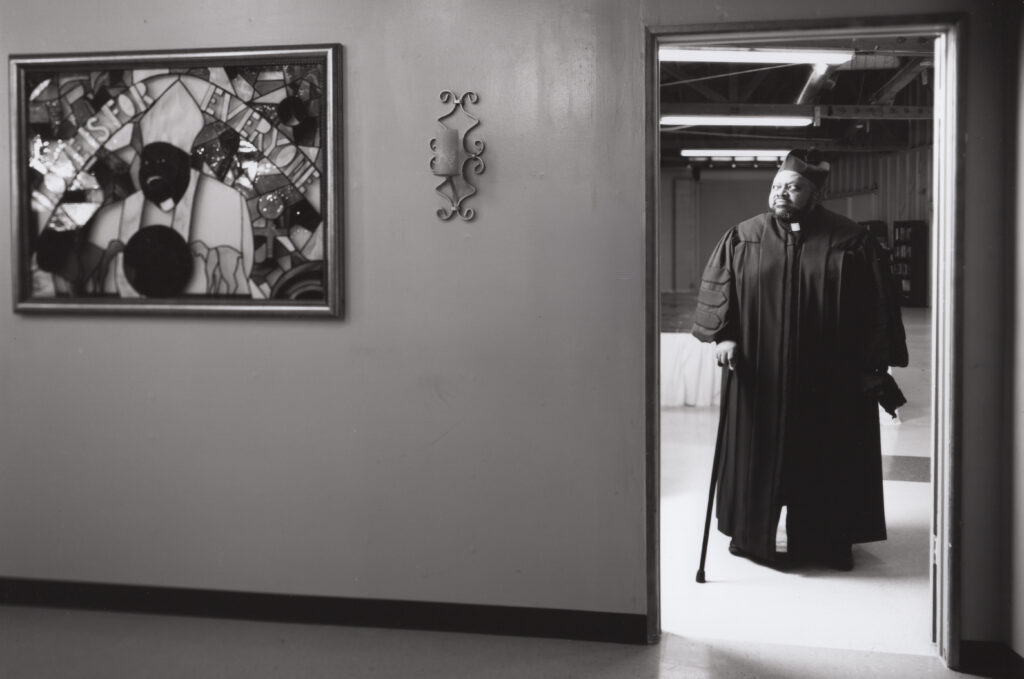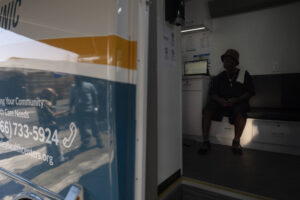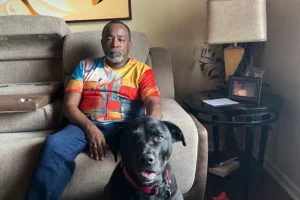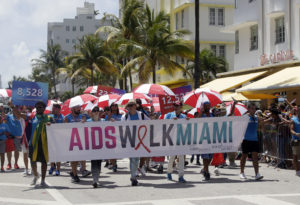Loud and Proud
A documentary tells the story of Carl Bean, a disco star who preached the gospel of love and acceptance at the height of the AIDS crisis. Archbishop Carl Bean smiles during interview in a scene from the documentary. (Courtesy of I Was Born This Was Production)
Archbishop Carl Bean smiles during interview in a scene from the documentary. (Courtesy of I Was Born This Was Production)
“I Was Born This Way” will be released on June 20.
If Carl Bean had only recorded the 1977 hit, “I Was Born This Way,” it would have been enough to secure him a place in the disco hall of fame. Not only did the gay anthem reach No. 15 on the U.S. dance charts, but with lyrics like, “I’m happy, carefree and gay, yes, I’m gay/ It ain’t a fault it’s a fact/ I was born this way,” it was a mainstay in clubs long after it dropped off the charts.
But Bean’s legacy goes beyond a single song. He founded Minority AIDS Project in 1985, three years after becoming an ordained minister and starting the Unity Fellowship of Christ Church in L.A. Supporting the LGBTQ community and all comers, its motto is “God is love and love is for everyone.” When chapters began to emerge in cities nationwide, it became a denomination. In 1999, Bean was consecrated as the first archbishop of the Unity Fellowship Church Movement.
It’s all in the inspirational new documentary, “I Was Born This Way,” directed by Sam Pollard and Daniel Junge, and co-produced by Wellington Love, which premiered at the Tribeca Film Festival in New York on June 5. You might recognize the title from the 2011 hit song by Lady Gaga, “Born This Way,” inspired by Bean’s legacy, as she says in the film, which also features Questlove, Dionne Warwick, Billy Porter and U.S. Rep. Maxine Waters.
“The fact that you can get them engaged means they see something special in the material,” Pollard tells Truthdig.com. “We live in a culture where everybody’s got to be a major celebrity. Here’s an opportunity to introduce a man who is unique and special. And I think when an audience sees this film, they’ll understand why we went on this journey with him.”
“Sometimes great films find you rather than the other way around.”
Junge learned about Bean while researching a series on protest music. That’s when he discovered that Gaga’s song was an homage. “Sometimes great films find you rather than the other way around,” says Junge. “I realized he was like two miles away from me, his church. We reached out to him just before the pandemic and squeezed in that interview.”
Junge won an Oscar for his 2012 short film, “Saving Face” about a plastic surgeon in Pakistan who helps victims of acid attacks. Pollard was nominated for an Oscar for “4 Little Girls” and won a primetime Emmy for “When the Levees Broke,” both made with Spike Lee.
“When Daniel sent me the interview with Carl, I knew immediately this is a special human being,” recalls Pollard. “His activism, his thoughtfulness, his sense of duty is what makes him special.”
A friendly and affable presence, Bean talks in the film of his early life in Baltimore when he knew he was different from other boys. He preferred doll houses and baton twirling to sports, and sang in the church choir. He worked hard to maintain a positive disposition even while being molested by his uncle. As a teen, his homosexuality landed him in a mental hospital, where his birth mother happened to work as a custodian. Released into her custody, he took care of her children by day and turned tricks by night.
“He would go into graphic detail about it because that’s what his life was all about. He’s brutally honest,” says Junge. “At the height of the AIDS epidemic, he was describing exactly what you do with a condom when no one else was. He was an open book.”

Producer Wellington Love remembers the grim days of the AIDS crisis when he was still a teenager. “When we first started getting the new reports about GRID (Gay-Related Immune Deficiency), it scared the shit out of me,” he recalls. “If I had known about Carl and the work he was doing with MAP and Unity, I think my life would be a lot different. I’m just so thrilled and grateful that I got a chance to learn about this story and be a part of putting it out in the world. Hopefully, he will be a lesson to young people growing up, ’cause he was absolutely unapologetic about being a gay man.”
Bean was working at Macy’s in New York City when a co-worker suggested he attend service at the Harlem Christian Tabernacle. Singing in the choir, he was hooked. The Tabernacle was a hit, recording albums and touring, but he was dreaming bigger and moved to L.A. to try his hand as a pop singer.
“I Was Born This Way” was written by Chris Spierer and Bunny Jones, a Harlem hairdresser. After it was first recorded for Motown Records by Valentino in 1975, Bean made his version two years later with Jones’ friend Stevie Wonder playing drums. With a hit on his hands, he was offered a deal by Motown Records to re-record songs by David Ruffin of the Temptations, who was struggling with addiction at the time. But Bean declined, ending his career in music.
“He seemed a little reticent to talk about it,” Junge says of Bean’s decision. “I don’t think he saw it as an opportunity. He’s a man of integrity, and he didn’t think he could sing those songs in an honest fashion, and he opted not to.”
“I think this film at once honors and preserves Carl’s legacy.”
The film opens and ends with Billy Porter who, early on in a discussion with Chris Jones, son of Bunny, learns of a B-side entitled “Liberation,” which disappeared around the time it was recorded. Universal Music Group, a partner on the film, searched their vaults for the recording but found nothing.
“Then we interviewed Chris Jones and he said, ‘Oh yeah, I’m pretty sure I have that in my closet,’” laughs Junge. “We confirmed it was there and said, hold it, and got Billy [Porter] involved.” Remastered with Porter singing a duet against Bean’s original vocals, the song may never see the light of day due to rights issues and the many parties involved.
“I Was Born This Way” still has no distributor, and in the current oppressive political climate, securing one could be a problem. “I never thought I would live to see what’s happening now,” says Love. “I’m hopeful that by telling Carl’s story at a time when minorities are being erased and somehow DEI … it’s a bad word now. So, every time they take down a portrait or archive something, we have to put something back and put it back more forcefully. I think this film at once honors and preserves Carl’s legacy. It’s resistance, ’cause we have to have it.”
While some are reluctant to openly criticize the government’s anti-DEI initiative, Pollard has no such reservations, insisting others shouldn’t either.
“This is a time to speak out and speak up. By having this film come out at this time in this state of America says to me we don’t need to be silent. What Carl is all about is important to understanding what democracy means in America. There’s no reason to shut up. If you fold to what this administration is doing, if you let them take an inch, they’ll take a mile. You have to speak up, you have to speak out and you do it through the way you know how. And we as filmmakers do it through filmmaking. We did it through telling the story of Carl Bean.”
WAIT BEFORE YOU GO...This year, the ground feels uncertain — facts are buried and those in power are working to keep them hidden. Now more than ever, independent journalism must go beneath the surface.
At Truthdig, we don’t just report what's happening — we investigate how and why. We follow the threads others leave behind and uncover the forces shaping our future.
Your tax-deductible donation fuels journalism that asks harder questions and digs where others won’t.
Don’t settle for surface-level coverage.
Unearth what matters. Help dig deeper.
Donate now.






You need to be a supporter to comment.
There are currently no responses to this article.
Be the first to respond.